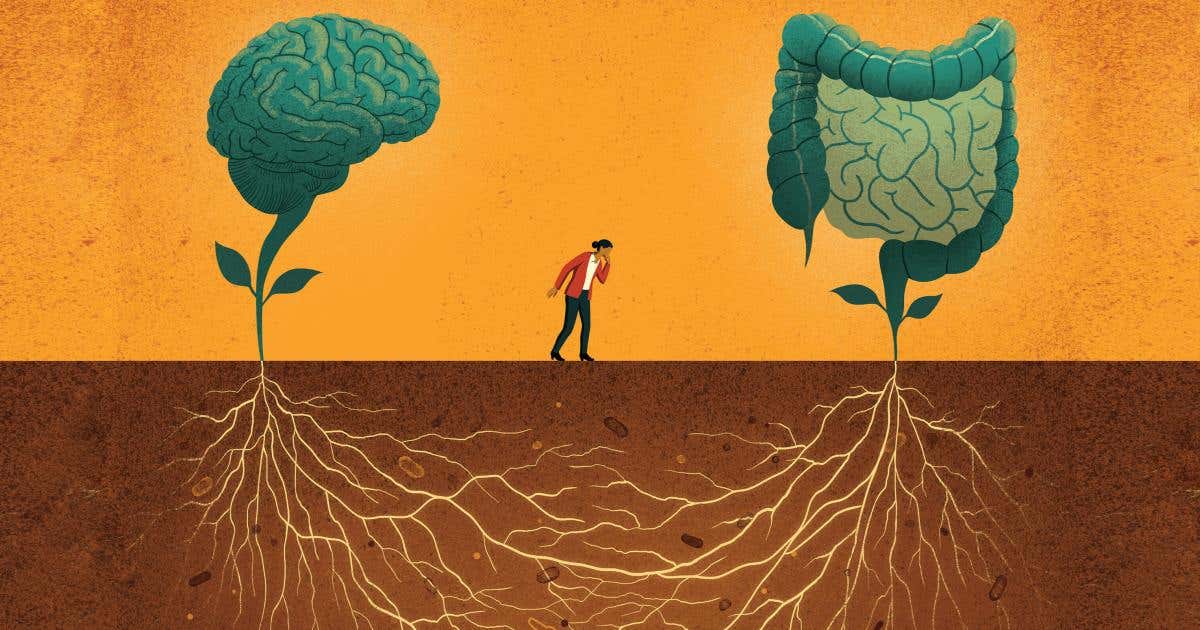First time ever: Researchers demonstrate gut microbiota talking to the brain
These findings demonstrate that a direct dialog occurs between the gut microbiota and the brain and could lead to new therapeutic approaches

[Apr 16, 2022: Rebeyrotte Myriam, Institut Pasteur]
These findings demonstrate that a direct dialog occurs between the gut microbiota and the brain. (CREDIT: Davide Bonazzi)
Gut microbiota by-products circulate in the bloodstream, regulating host physiological processes including immunity, metabolism and brain functions. Scientists from the Institut Pasteur (a partner research organization of Université Paris Cité), Inserm and the CNRS have discovered that hypothalamic neurons in an animal model directly detect variations in bacterial activity and adapt appetite and body temperature accordingly.
These findings demonstrate that a direct dialog occurs between the gut microbiota and the brain, a discovery that could lead to new therapeutic approaches for tackling metabolic disorders such as diabetes and obesity. The findings were published in Science.
The gut is the body's largest reservoir of bacteria. A growing body of evidence reveals the degree of interdependence between hosts and their gut microbiota, and emphasizes the importance of the gut-brain axis. At the Institut Pasteur, neurobiologists from the Perception and Memory Unit (Institut Pasteur/CNRS), immunobiologists from the Microenvironment and Immunity Unit (Institut Pasteur/Inserm), and microbiologists from the Biology and Genetics of the Bacterial Cell Wall Unit (Institut Pasteur / CNRS / Inserm) have shared their expertise to investigate how bacteria in the gut directly control the activity of particular neurons in the brain.
Decoding a direct dialog between the gut microbiota and the brain. (CREDIT: Institut Pasteur / Pascal Marseaud)
Related Stories:
He notes that it's all done within a nanocarrier composed of materials that our our own bodies make - bile acids - which means that the carrier itself has therapeutic effects that works with the loaded agent to reinstate normal metabolism in the short-term and restore immune competence in the longer term.
"This combined approach is what makes this system a promising new therapy for autoimmune disease in general,” he said.
One of the major obstacles to creating a successful oral medication for diabetes is that the drug breaks down in the patient’s gastrointestinal system. The nanoparticle, however, protects the insulin while carrying it to the site of the pancreas, where it unloads the medication.
The nanoparticle is more than just a means of delivery, though. It’s made from a polymerized ursodeoxycholic acid, a bile acid. In its more natural form as a monomer, it has been used to make drugs for dissolving gallstones and liver stones. It hasn’t, however, been very effective as a treatment for diabetes. Fahmy’s research team polymerized the bile acid, though, which increases its ability to bind with receptors critical to metabolism, making it much more effective as a treatment for diabetes.
In their tests on mice, the nanoparticles reversed inflammation, restored metabolic functions, and extended their survival, while the cargo of the particles restored insulin levels.
“So you actually are curing the disease while you are maintaining insulin levels at the same time,” Fahmy said.
The drug delivery system is also the basis for Toralgen, a biotechnology company that Fahmy co-founded.
“The potential is enormous for diabetes and other disease states as well,” Fahmy said. “I am hopeful that this technical development will be leveraged in the development of urgent solutions to what are presently difficult challenges in autoimmunity, cancer, allergies and infections.”
For more science and technology stories check out our New Discoveries section at The Brighter Side of News.
Note: Materials provided above by Institut Pasteur. Content may be edited for style and length.
Like these kind of feel good stories? Get the Brighter Side of News' newsletter.
Tags: #New_Discoveries, #Microbiome, #Brain, #Communication, #Science, #Medical_Good_News, #Research, #Bacteria, #The_Brighter_Side_of_News
Joseph Shavit
Head Science News Writer | Communicating Innovation & Discovery
Based in Los Angeles, Joseph Shavit is an accomplished science journalist, head science news writer and co-founder at The Brighter Side of News, where he translates cutting-edge discoveries into compelling stories for a broad audience. With a strong background spanning science, business, product management, media leadership, and entrepreneurship, Joseph brings a unique perspective to science communication. His expertise allows him to uncover the intersection of technological advancements and market potential, shedding light on how groundbreaking research evolves into transformative products and industries.
